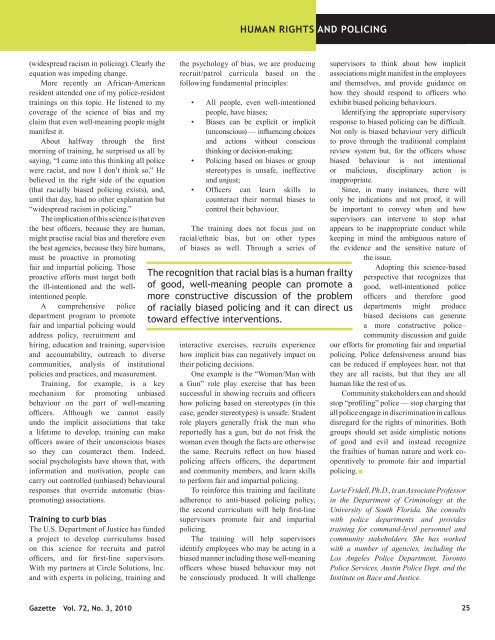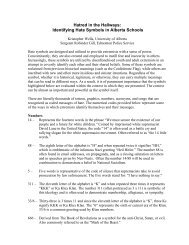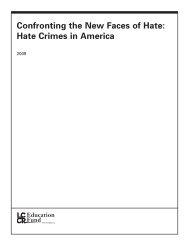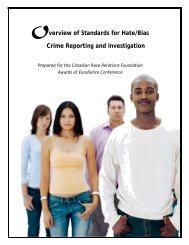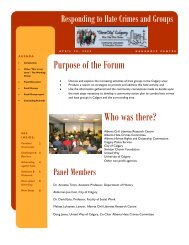RCMP Gazette Human Rights and Policing - Alberta Hate Crimes ...
RCMP Gazette Human Rights and Policing - Alberta Hate Crimes ...
RCMP Gazette Human Rights and Policing - Alberta Hate Crimes ...
Create successful ePaper yourself
Turn your PDF publications into a flip-book with our unique Google optimized e-Paper software.
huMAN RiGhTS AND POliCiNG<strong>RCMP</strong> COVER(widespread racism in policing). Clearly theequation was impeding change.More recently an African-Americanresident attended one of my police-residenttrainings on this topic. He listened to mycoverage of the science of bias <strong>and</strong> myclaim that even well-meaning people mightmanifest it.About halfway through the firstmorning of training, he surprised us all bysaying, “I came into this thinking all policewere racist, <strong>and</strong> now I don’t think so.” Hebelieved in the right side of the equation(that racially biased policing exists), <strong>and</strong>,until that day, had no other explanation but“widespread racism in policing.”The implication of this science is that eventhe best officers, because they are human,might practise racial bias <strong>and</strong> therefore eventhe best agencies, because they hire humans,must be proactive in promotingfair <strong>and</strong> impartial policing. Thoseproactive efforts must target boththe ill-intentioned <strong>and</strong> the wellintentionedpeople.A comprehensive policedepartment program to promotefair <strong>and</strong> impartial policing wouldaddress policy, recruitment <strong>and</strong>hiring, education <strong>and</strong> training, supervision<strong>and</strong> accountability, outreach to diversecommunities, analysis of institutionalpolicies <strong>and</strong> practices, <strong>and</strong> measurement.Training, for example, is a keymechanism for promoting unbiasedbehaviour on the part of well-meaningofficers. Although we cannot easilyundo the implicit associations that takea lifetime to develop, training can makeofficers aware of their unconscious biasesso they can counteract them. Indeed,social psychologists have shown that, withinformation <strong>and</strong> motivation, people cancarry out controlled (unbiased) behaviouralresponses that override automatic (biaspromoting)associations.Training to curb biasThe U.S. Department of Justice has fundeda project to develop curriculums basedon this science for recruits <strong>and</strong> patrolofficers, <strong>and</strong> for first-line supervisors.With my partners at Circle Solutions, Inc.<strong>and</strong> with experts in policing, training <strong>and</strong>the psychology of bias, we are producingrecruit/patrol curricula based on thefollowing fundamental principles:• All people, even well-intentionedpeople, have biases;• Biases can be explicit or implicit(unconscious) — influencing choices<strong>and</strong> actions without consciousthinking or decision-making;• <strong>Policing</strong> based on biases or groupstereotypes is unsafe, ineffective<strong>and</strong> unjust;• Officers can learn skills tocounteract their normal biases tocontrol their behaviour.The training does not focus just onracial/ethnic bias, but on other typesof biases as well. Through a series ofThe recognition that racial bias is a human frailtyof good, well-meaning people can promote amore constructive discussion of the problemof racially biased policing <strong>and</strong> it can direct ustoward effective interventions.interactive exercises, recruits experiencehow implicit bias can negatively impact ontheir policing decisions.One example is the “Woman/Man witha Gun” role play exercise that has beensuccessful in showing recruits <strong>and</strong> officershow policing based on stereotypes (in thiscase, gender stereotypes) is unsafe. Studentrole players generally frisk the man whoreportedly has a gun, but do not frisk thewoman even though the facts are otherwisethe same. Recruits reflect on how biasedpolicing affects officers, the department<strong>and</strong> community members, <strong>and</strong> learn skillsto perform fair <strong>and</strong> impartial policing.To reinforce this training <strong>and</strong> facilitateadherence to anti-biased policing policy,the second curriculum will help first-linesupervisors promote fair <strong>and</strong> impartialpolicing.The training will help supervisorsidentify employees who may be acting in abiased manner including those well-meaningofficers whose biased behaviour may notbe consciously produced. It will challengesupervisors to think about how implicitassociations might manifest in the employees<strong>and</strong> themselves, <strong>and</strong> provide guidance onhow they should respond to officers whoexhibit biased policing behaviours.Identifying the appropriate supervisoryresponse to biased policing can be difficult.Not only is biased behaviour very difficultto prove through the traditional complaintreview system but, for the officers whosebiased behaviour is not intentionalor malicious, disciplinary action isinappropriate.Since, in many instances, there willonly be indications <strong>and</strong> not proof, it willbe important to convey when <strong>and</strong> howsupervisors can intervene to stop whatappears to be inappropriate conduct whilekeeping in mind the ambiguous nature ofthe evidence <strong>and</strong> the sensitive nature ofthe issue.Adopting this science-basedperspective that recognizes thatgood, well-intentioned policeofficers <strong>and</strong> therefore gooddepartments might producebiased decisions can generatea more constructive police–community discussion <strong>and</strong> guideour efforts for promoting fair <strong>and</strong> impartialpolicing. Police defensiveness around biascan be reduced if employees hear, not thatthey are all racists, but that they are allhuman like the rest of us.Community stakeholders can <strong>and</strong> shouldstop “profiling” police — stop charging thatall police engage in discrimination in callousdisregard for the rights of minorities. Bothgroups should set aside simplistic notionsof good <strong>and</strong> evil <strong>and</strong> instead recognizethe frailties of human nature <strong>and</strong> work cooperativelyto promote fair <strong>and</strong> impartialpolicing. ▪Lorie Fridell, Ph.D., is an Associate Professorin the Department of Criminology at theUniversity of South Florida. She consultswith police departments <strong>and</strong> providestraining for comm<strong>and</strong>-level personnel <strong>and</strong>community stakeholders. She has workedwith a number of agencies, including theLos Angeles Police Department, TorontoPolice Services, Austin Police Dept. <strong>and</strong> theInstitute on Race <strong>and</strong> Justice.<strong>Gazette</strong> Vol. 72, No. 3, 2010 25


